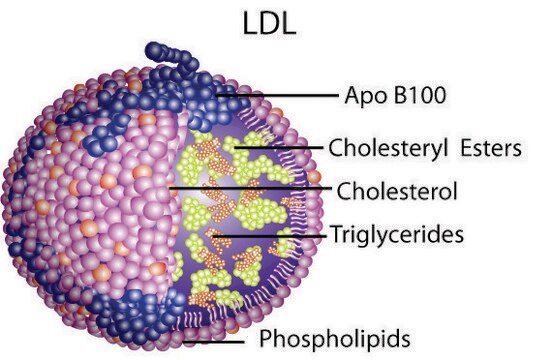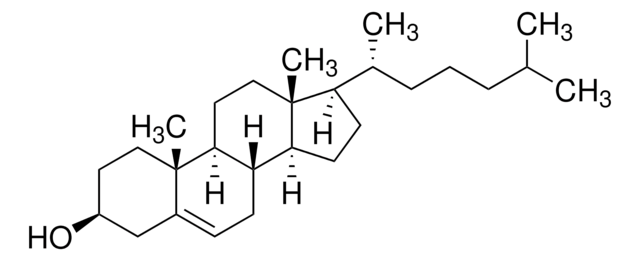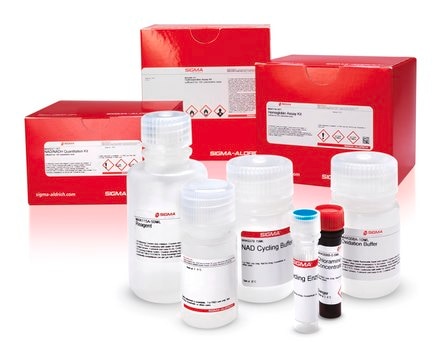437641
Lipoproteins, High Density, Human Plasma
Synonym(s):
HDL
Sign Into View Organizational & Contract Pricing
All Photos(1)
About This Item
UNSPSC Code:
12352202
Recommended Products
assay
≥95% (of total lipoprotein content, electrophoresis)
Quality Level
form
liquid
manufacturer/tradename
Calbiochem®
storage condition
do not freeze
shipped in
wet ice
storage temp.
2-8°C
General description
A 10 mg vial contains ~5 mg of protein.
Native high density lipoproteins from human plasma. Cholesterol-carrier lipoprotein that acts as scavenger of tissue cholesterol. Important in cholesterol efflux from tissues. Involved in return of cholesterol from the periphery to the liver for removal as bile acids. Composition: 55-45% lipid, 45-55% protein.
Native high density lipoproteins from human plasma. Cholesterol-carrier protein that acts as a scavenger of tissue cholesterol. Important in cholesterol efflux from tissues. Involved in return of cholesterol from the periphery to the liver for removal as bile acids. (Composition: 55-45% lipid, 45-55% protein. Note: 10 mg vial contains 5 mg of protein.)
Packaging
Please refer to vial label for lot-specific concentration.
Warning
Toxicity: Standard Handling (A)
Other Notes
Badimon, J.J., et al. 1992. Circulation 86, III86.
Legal Information
CALBIOCHEM is a registered trademark of Merck KGaA, Darmstadt, Germany
Storage Class
12 - Non Combustible Liquids
wgk_germany
nwg
flash_point_f
Not applicable
flash_point_c
Not applicable
Certificates of Analysis (COA)
Search for Certificates of Analysis (COA) by entering the products Lot/Batch Number. Lot and Batch Numbers can be found on a product’s label following the words ‘Lot’ or ‘Batch’.
Already Own This Product?
Find documentation for the products that you have recently purchased in the Document Library.
Customers Also Viewed
Xu Cui et al.
Stroke, 41(9), 2044-2049 (2010-07-31)
Niacin is the most effective medication in current clinical use for increasing high-density lipoprotein cholesterol. We tested the hypothesis that niacin treatment of stroke promotes synaptic plasticity and axon growth in the ischemic brain. Male Wistar rats were subjected to
Wojciech Paslawski et al.
Proceedings of the National Academy of Sciences of the United States of America, 116(30), 15226-15235 (2019-07-05)
The progressive accumulation, aggregation, and spread of α-synuclein (αSN) are common hallmarks of Parkinson's disease (PD) pathology. Moreover, numerous proteins interact with αSN species, influencing its toxicity in the brain. In the present study, we extended analyses of αSN-interacting proteins
Our team of scientists has experience in all areas of research including Life Science, Material Science, Chemical Synthesis, Chromatography, Analytical and many others.
Contact Technical Service



